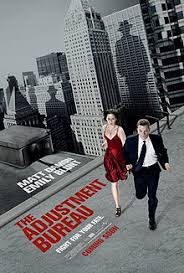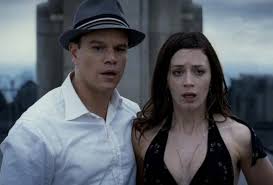Having watched The Adjustment Bureau this past weekend, I couldn't help but relate it to another recent movie: Final Destination 5. Well, really the Final Destination series as a whole, since I've only seen the first one in full and bits of 2 and 3. Both films deal with the idea of fate and free will: can you outrun your fate and change it? Now, The Adjustment Bureau takes this idea seriously, while FD uses it mostly as an excuse to set up increasingly-convoluted Rube-Goldbergian death scenes, with philosophical quandaries being an accidental afterthought. Unfortunately, both films also have a problem sticking the ending, squandering early promise with pandering third acts.

The Adjustment Bureau follows aspiring politician David Norris (Matt Damon), who's running for Senate from New York. On election night, he bumps into Elise (Emily Blunt), a ballerina who he instantly feels an attraction for. Soon afterwards, he runs into her again on the bus on his way to work, causing him to see something he's not supposed to see. A mysterious group of men in fedoras (Anthony Mackie and John Slattery chief among them) tell David that his whole life has been mapped out for him by someone known only as The Chairman, and it's their duty to ensure he stays on course. However, his plan doesn't include Elise, who he's now willing to fight for despite any and all consequences.
Based on a short story by Philip K. Dick, the film plays for a while with the idea that free will is nonexistent, only the idea of free will is real. And it's an interesting conceit, especially since screenwriter/first-time-director George Nolfi (The Bourne Ultimatum) seems game to play with these difficult ideas. Nolfi also has an eye for scene composure and camera movement, suggesting that he may have something of a career ahead of him. The film also benefits from real chemistry between Damon and Blunt, a feat that's becoming increasingly more rare in Hollywood today, as well as a scene-stealing performance from the great Terrence Stamp.

Unfortunately, the film buckles under the need for a conventional Hollywood ending, completely disregarding everything the film established for a third act that plays out like a lesser Jumper (and that's saying something). Mackie is given a particularly thankless role of being an exposition machine as well as a deus ex machina for practically every philosophical hiccup. And Slattery is horrendously underused, given only a handful of great moments and otherwise being reduced to background. It's a shame the film wastes some of the interesting and provocative ideas it introduces, instead choosing to go a more predictable route. I'd love to see what kind of film this could have been if it had been produced at a smaller studio or independently.

Ultimately, The Adjustment Bureau could use some adjustments itself. It promised to be a sci-fi romance that also served as philosophical and even quasi-religious thinkpiece but instead pandered to an audience-pleasing ending. Perhaps a little free will here would have gone a long way. B-
The Adjustment Bureau follows aspiring politician David Norris (Matt Damon), who's running for Senate from New York. On election night, he bumps into Elise (Emily Blunt), a ballerina who he instantly feels an attraction for. Soon afterwards, he runs into her again on the bus on his way to work, causing him to see something he's not supposed to see. A mysterious group of men in fedoras (Anthony Mackie and John Slattery chief among them) tell David that his whole life has been mapped out for him by someone known only as The Chairman, and it's their duty to ensure he stays on course. However, his plan doesn't include Elise, who he's now willing to fight for despite any and all consequences.
Based on a short story by Philip K. Dick, the film plays for a while with the idea that free will is nonexistent, only the idea of free will is real. And it's an interesting conceit, especially since screenwriter/first-time-director George Nolfi (The Bourne Ultimatum) seems game to play with these difficult ideas. Nolfi also has an eye for scene composure and camera movement, suggesting that he may have something of a career ahead of him. The film also benefits from real chemistry between Damon and Blunt, a feat that's becoming increasingly more rare in Hollywood today, as well as a scene-stealing performance from the great Terrence Stamp.
Unfortunately, the film buckles under the need for a conventional Hollywood ending, completely disregarding everything the film established for a third act that plays out like a lesser Jumper (and that's saying something). Mackie is given a particularly thankless role of being an exposition machine as well as a deus ex machina for practically every philosophical hiccup. And Slattery is horrendously underused, given only a handful of great moments and otherwise being reduced to background. It's a shame the film wastes some of the interesting and provocative ideas it introduces, instead choosing to go a more predictable route. I'd love to see what kind of film this could have been if it had been produced at a smaller studio or independently.
Ultimately, The Adjustment Bureau could use some adjustments itself. It promised to be a sci-fi romance that also served as philosophical and even quasi-religious thinkpiece but instead pandered to an audience-pleasing ending. Perhaps a little free will here would have gone a long way. B-
Comments